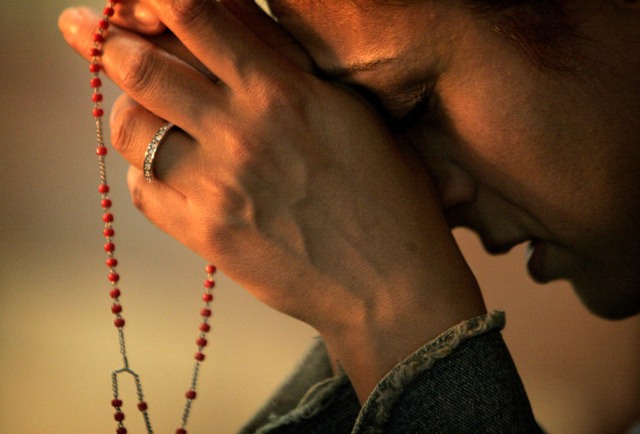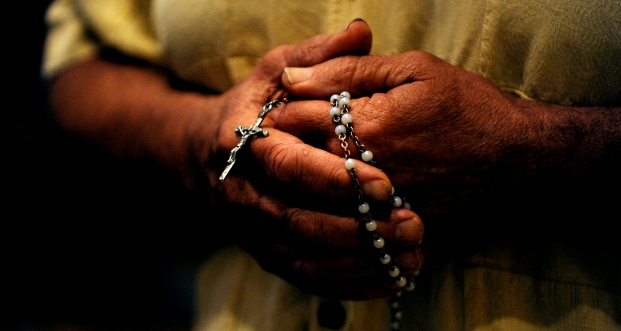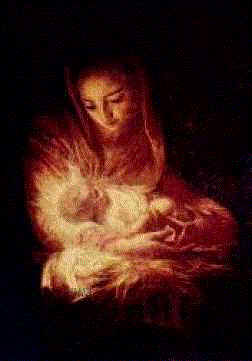The Secret Of The Rosary – First Decade – Part 1


(St. Louis Marie de Montfort)
{play}images/stories/audio/The secret of the Rosary – decade 1-1.mp3{/play}
First Rose
The Rosary is made up of two things: mental prayer and vocal prayer. In the Rosary mental prayer is none other than meditation of the chief mysteries of the life, death and glory of Jesus Christ and of his blessed Mother. Vocal prayer consists in saying fifteen decades of the Hail Mary, each decade headed by an Our Father, while at the same time meditating on and contemplating the fifteen principal virtues which Jesus and Mary practised in the fifteen mysteries of the Rosary.
In the first five decades we must honour the five Joyful Mysteries and meditate on them; in the second five decades, the Sorrowful Mysteries; and in the third group of five, the Glorious Mysteries. So the Rosary is a blessed blending of mental and vocal prayer by which we honour and learn to imitate the mysteries and the virtues of the life, death, passion and glory of Jesus and Mary.
Second Rose
Since the Rosary is composed, principally and in substance, of the prayer of Christ and the Angelic Salutation, that is, the Our Father and the Hail Mary, it was without doubt the first prayer and the principal devotion of the faithful and has been in use all through the centuries, from the time of the apostles and disciples down to the present.
It was only in the year 1214, however, that the Church received the Rosary in its present form and according to the method we use today. It was given to the Church by St. Dominic, who had received it from the Blessed Virgin as a means of converting the Albigensians and other sinners.
I will tell you the story of how he received it, which is found in the very well-known book De Dignitate Psalterii, by Blessed Alan de la Roche. Saint Dominic, seeing that the gravity of people’s sins was hindering the conversion of the Albigensians, withdrew into a forest near Toulouse, where he prayed continuously for three days and three nights. During this time he did nothing but weep and do harsh penances in order to appease the anger of God. He used his discipline so much that his body was lacerated, and finally he fell into a coma.
At this point our Lady appeared to him, accompanied by three angels, and she said, “Dear Dominic, do you know which weapon the Blessed Trinity wants to use to reform the world?”
“Oh, my Lady,” answered Saint Dominic, “you know far better than I do, because next to your Son Jesus Christ you have always been the chief instrument of our salvation.”
Then our Lady replied, “I want you to know that, in this kind of warfare, the principal weapon has always been the Angelic Psalter, which is the foundation-stone of the New Testament. Therefore, if you want to reach these hardened souls and win them over to God, preach my Psalter.”
So he arose, comforted, and burning with zeal for the conversion of the people in that district, he made straight for the cathedral. At once unseen angels rang the bells to gather the people together, and Saint Dominic began to preach.
At the very beginning of his sermon, an appalling storm broke out, the earth shook, the sun was darkened, and there was so much thunder and lightning that all were very much afraid. Even greater was their fear when, looking at a picture of our Lady exposed in a prominent place, they saw her raise her arms to heaven three times to call down God’s vengeance upon them if they failed to be converted, to amend their lives, and seek the protection of the holy Mother of God.
God wished, by means of these supernatural phenomena, to spread the new devotion of the holy Rosary and to make it more widely known.
At last, at the prayer of Saint Dominic, the storm came to an end, and he went on preaching. So fervently and compellingly did he explain the importance and value of the Rosary that almost all the people of Toulouse embraced it and renounced their false beliefs. In a very short time a great improvement was seen in the town; people began leading Christian lives and gave up their former bad habits.
Third Rose
The miraculous way in which the devotion to the holy Rosary was established is something of a parallel to the way in which God gave his law to the world on Mount Sinai, and it obviously proves its value and importance.
Inspired by the Holy Spirit, instructed by the Blessed Virgin as well as by his own experience, Saint Dominic preached the Rosary for the rest of his life. He preached it by his example as well as by his sermons, in cities and in country places, to people of high station and low, before scholars and the uneducated, to Catholics and to heretics.
The Rosary, which he said every day, was his preparation for every sermon and his little tryst with our Lady immediately after preaching.
One day he had to preach at Notre Dame in Paris, and it happened to be the feast of St. John the Evangelist. He was in a little chapel behind the high altar prayerfully preparing his sermon by saying the Rosary, as he always did, when our Lady appeared to him and said: “Dominic, even though what you have planned to say may be very good, I am bringing you a much better sermon.”
Saint Dominic took in his hands the book our Lady proffered, read the sermon carefully and, when he had understood it and meditated on it, he gave thanks to her.
When the time came, he went up into the pulpit and, in spite of the feast day, made no mention of Saint John other than to say that he had been found worthy to be the guardian of the Queen of Heaven. The congregation was made up of theologians and other eminent people, who were used to hearing unusual and polished discourses; but Saint Dominic told them that it was not his desire to give them a learned discourse, wise in the eyes of the world, but that he would speak in the simplicity of the Holy Spirit and with his forcefulness.
So he began preaching the Rosary and explained the Hail Mary word by word as he would to a group of children, and used the very simple illustrations which were in the book given him by our Lady.
Carthagena, the great scholar, quoting Blessed Alan de la Roche in De Dignitate Psalterii, describes how this took place.
“Blessed Alan writes that one day Father Dominic said to him in a vision, “My son, it is good to preach; but there is always a danger of looking for praise rather than the salvation of souls. Listen carefully to what happened to me in Paris, so that you may be on your guard against this kind of mistake. I was to preach in the great church dedicated to the Blessed Virgin and I was particularly anxious to give a fine sermon, not out of pride, but because of the high intellectual stature of the congregation.
An hour before the time I had to preach, I was dutifully saying my Rosary – as I always did before giving a sermon – when I fell into ecstasy. I saw my beloved friend, the Mother of God, coming towards me with a book in her hand. “Dominic,” she said, “your sermon for today may be very good indeed, but no matter how good it is, I have brought you one that is very much better.”
Of course I was overjoyed, and I took the book and read every word of it. Just as our Lady had said, I found exactly the right things to say in my sermon, so I thanked her with all my heart.
When it was time to begin, I saw that the University of Paris had turned out in full force, as well as a large number of noblemen. They had all seen and heard of the great things that the good Lord had been doing through me.
I went up into the pulpit. It was the feast of Saint John the Evangelist but all I said about him was that he had been found worthy to be the guardian of the Queen of Heaven. Then I addressed the congregation:
“My Lords and illustrious doctors of the University, you are accustomed to hearing learned sermons suited to your refined tastes. Now I do not want to speak to you in the scholarly language of human wisdom but, on the contrary, to show you the Spirit of God and his greatness.”””
Here ends the quotation from Blessed Alan, after which Carthagena goes on to say in his own words, “Then Saint Dominic explained the Angelic Salutation to them, using simple comparisons and examples from everyday life.”
Blessed Alan, according to Carthagena, mentioned several other occasions when our Lord and our Lady appeared to Saint Dominic to urge him and inspire him to preach the Rosary more and more in order to wipe out sin and convert sinners and heretics.
In another passage Carthagena says, “Blessed Alan said our Lady revealed to him that, after she had appeared to Saint Dominic, her blessed Son appeared to him and said, “Dominic, I rejoice to see that you are not relying on your own wisdom and that, rather than seek the empty praise of men, you are working with great humility for the salvation of souls.
But many priests want to preach thunderously against the worst kinds of sin at the very outset, failing to realize that before a sick person is given bitter medicine, he needs to be prepared by being put into the right frame of mind to really benefit by it.
That is why, before doing anything else, priests should try to kindle a love of prayer in people’s hearts and especially a love of my Angelic Psalter. If only they would all start saying it and would really persevere, God in his mercy could hardly refuse to give them his grace. So I want you to preach my Rosary.””
In another place Blessed Alan says, “All priests say a Hail Mary with the faithful before preaching, to ask for God’s grace. They do this because of a revelation that Saint Dominic had from our Lady. “My son,” she said one day, “do not be surprised that your sermons fail to bear the results you had hoped for. You are trying to cultivate a piece of ground which has not had any rain. Now when God planned to renew the face of the earth, he started by sending down rain from heaven – and this was the Angelic Salutation. In this way God reformed the world.
So when you give a sermon, urge people to say my Rosary, and in this way your words will bear much fruit for souls.”
Saint Dominic lost no time in obeying, and from then on he exerted great influence by his sermons.” (This last quotation is from “The Book of Miracles of the Holy Rosary,” written in Italian, also found in Justin’s works, Sermon 143.)
I have been very pleased to quote these well-known authors word for word for the benefit of those who might otherwise have doubts as to the marvellous power of the Rosary.
As long as priests followed Saint Dominic’s example and preached devotion to the holy Rosary, piety and fervor thrived throughout the Christian world and in those religious orders which were devoted to the Rosary. But since people have neglected this gift from heaven, all kinds of sin and disorder have spread far and wide.
Fourth Rose
All things, even the holiest, are subject to change, especially when they are dependent on man’s free will. It is hardly to be wondered at, then, that the Confraternity of the Holy Rosary only retained its first fervour for a century after it was instituted by Saint Dominic. After this it was like a thing buried and forgotten.
Doubtless, too, the wicked scheming and jealousy of the devil were largely responsible for getting people to neglect the Rosary, and thus block the flow of God’s grace which it had drawn upon the world.
Thus, in 1349 God punished the whole of Europe with the most terrible plague that had ever been known. Starting in the east, it spread throughout Italy, Germany, France, Poland and Hungary, bringing desolation wherever it went, for out of a hundred men hardly one lived to tell the tale. Big cities, towns, villages and monasteries were almost completely deserted during the three years that the epidemic lasted.
This scourge of God was quickly followed by two others, the heresy of the Flagellants and a tragic schism in 1376.
Later on, when these trials were over, thanks to the mercy of God, our Lady told Blessed Alan to revive the former Confraternity of the Holy Rosary. Blessed Alan was one of the Dominican Fathers at the monastery at Dinan, in Brittany. He was an eminent theologian and a famous preacher. Our Lady chose him because, since the Confraternity had originally been started in that province, it was fitting that a Dominican from the same province should have the honour of re-establishing it.
Blessed Alan began this great work in 1460, after a special warning from our Lord. This is how he received that urgent message, as he himself tells it:
One day when he was offering Mass, our Lord, who wished to spur him on to preach the holy Rosary, spoke to him in the Sacred Host. “How can you crucify me again so soon?” Jesus said. “What did you say, Lord?” asked Blessed Alan, horrified. “You crucified me once before by your sins,” answered Jesus, “and I would willingly be crucified again rather than have my Father offended by the sins you used to commit. You are crucifying me again now because you have all the learning and understanding that you need to preach my Mother’s Rosary, and you are not doing it. If you only did that, you could teach many souls the right path and lead them away from sin. But you are not doing it, and so you yourself are guilty of the sins that they commit.”
This terrible reproach made Blessed Alan solemnly resolve to preach the Rosary unceasingly.
Our Lady also said to him one day to inspire him to preach the Rosary more and more, “You were a great sinner in your youth, but I obtained the grace of your conversion from my Son. Had such a thing been possible, I would have liked to have gone through all kinds of suffering to save you, because converted sinners are a glory to me. And I would have done that also to make you worthy of preaching my Rosary far and wide.”
Saint Dominic appeared to Blessed Alan as well and told him of the great results of his ministry: he had preached the Rosary unceasingly, his sermons had borne great fruit and many people had been converted during his missions.
He said to Blessed Alan, “See what wonderful results I have had through preaching the Rosary. You and all who love our Lady ought to do the same so that, by means of this holy practice of the Rosary, you may draw all people to the real science of the virtues.”
Briefly, then, this is the history of how Saint Dominic established the holy Rosary and of how Blessed Alan de la Roche restored it.
Fifth Rose
Strictly speaking, there can be only one kind of Confraternity of the Rosary, that is, one whose members agree to say the entire Rosary of 150 Hail Marys every day. However, considering the fervour of those who say it, we may distinguish three kinds: Ordinary Membership, which entails saying the complete Rosary once a week; Perpetual Membership, which requires it to be said only once a year; Daily Membership, which obliges one to say it all every day, that is, the fifteen decades made up of 150 Hail Marys.
None of these oblige under pain of sin. It is not even a venial sin to fail in this duty because such an undertaking is entirely voluntary and supererogatory. Needless to say, people should not join the Confraternity if they do not intend to fulfil their obligation by saying the Rosary as often as is required, without, however, neglecting the duties of their state in life.
So whenever the Rosary clashes with a duty of one’s state in life, holy as the Rosary is, one must give preference to the duty to be performed. Similarly, sick people are not obliged to say the whole Rosary or even part of it if this effort might tire them and make them worse.
If you have been unable to say it because of some duty required by obedience or because you genuinely forgot, or because of some urgent necessity, you have not committed even a venial sin. You will then receive the benefits of the Confraternity just the same, sharing in the graces and merits of your brothers and sisters in the Rosary, who are saying it throughout the world.
And, my dear Catholic people, even if you fail to say your Rosary out of sheer carelessness or laziness, as long as you do not have any formal contempt for it, you do not sin, absolutely speaking, but you forfeit your participation in the prayers, good works and merits of the Confraternity. Moreover, because you have not been faithful in things that are little and of supererogation, almost without knowing it you may fall into the habit of neglecting big things, such as those duties which bind under pain of sin; for “He that scorns small things shall fall little by little” (Sir. 19:1).





